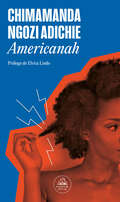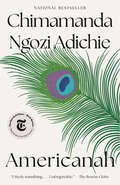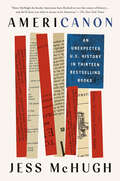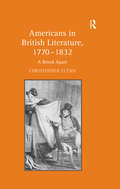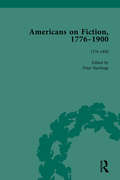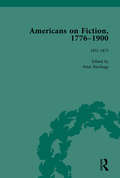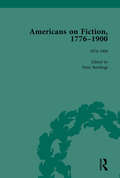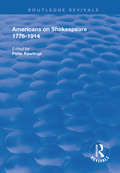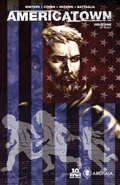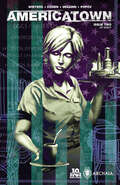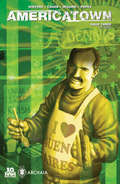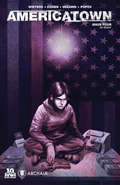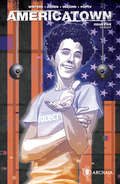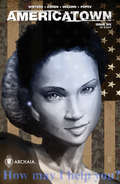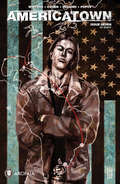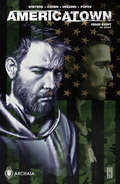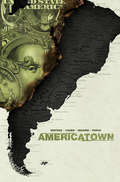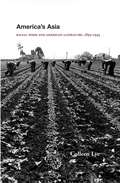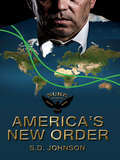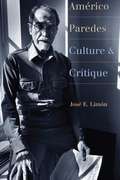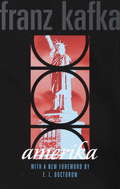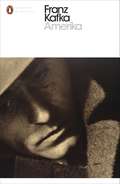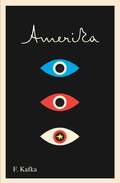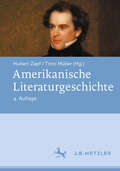- Table View
- List View
Americanah (edición especial limitada)
by Chimamanda Ngozi AdichieUna original historia sobre la inmigración en Estados Unidos desde el punto de vista de una estudiante de literatura nigeriana. Americanah ha sido galardonada con el National Book Critics Circle Award 2014 y seleccionada por los ciudadanos de Nueva York como el libro ganador de la campaña «One Book, One New York» 2017. Lagos, mediados de los noventa. En el marco de una dictadura militar y en una Nigeria que ofrece poco o ningún futuro, Ifemelu y Obinze, dos adolescentes atípicos, se enamoran apasionadamente. Como gran parte de su generación, saben que antes o después tendrán que dejar el país. Obinze siempre ha soñado con vivir en Estados Unidos, pero es Ifemelu quien consigue el visado para vivir con su tía en Brooklyn y estudiar en la universidad. Mientras Obinze lucha contra la burocracia para reunirse con Ifemelu, ella se encuentra en una América donde nada es como se imaginaba, comenzando por la importancia del color de su piel. Todas sus experiencias, desgracias y aventuras conducen a una única pregunta: ¿acabará convirtiéndose en una «americanah»? Americanah, que recoge el término burlón con que los nigerianos se refieren a los que vuelven de Estados Unidos dándose aires, es una historia de amor a lo largo de tres décadas y tres continentes, la historia de cómo se crea una identidad al margen de los dictados de la sociedad y sus prejuicios. Reseñas:«Confirma el virtuosismo, la empatía sin límites y la punzante agudeza social de Adichie.»Dave Eggers «Hay algunas novelas que cuentan una gran historia y otras que consiguen que cambies la manera que tienes de ver el mundo. Americanah, de Chimamanda Ngozi Adichie, consigue las dos cosas.»Elisabeth Day, The Guardian «Americanah es esa cosa rara en la ficción literaria contemporánea: una exuberante historia de amor que también es una crítica social penetrante y divertida [...] Adichie escribe con perspicacia.»Vogue
Americanah: A novel
by Chimamanda Ngozi Adichie10th ANNIVERSARY EDITION • NATIONAL BESTSELLER • A modern classic about star-crossed lovers that explores questions of race and being Black in America—and the search for what it means to call a place home. • From the award-winning author of We Should All Be Feminists and Half of a Yellow Sun • WITH A NEW INTRODUCTION BY THE AUTHOR "An expansive, epic love story."—O, The Oprah Magazine One of the New York Times&’s 100 Best Books of the 21st Century • One of The Atlantic&’s Great American Novels of the Past 100 YearsIfemelu and Obinze are young and in love when they depart military-ruled Nigeria for the West. Beautiful, self-assured Ifemelu heads for America, where despite her academic success, she is forced to grapple with what it means to be Black for the first time. Quiet, thoughtful Obinze had hoped to join her, but with post–9/11 America closed to him, he instead plunges into a dangerous, undocumented life in London. At once powerful and tender, Americanah is a remarkable novel that is "dazzling…funny and defiant, and simultaneously so wise." —San Francisco Chronicle
Americanon: An Unexpected U.S. History in Thirteen Bestselling Books
by Jess McHugh&“An elegant, meticulously-researched and eminently readable history of the books that define us as Americans. For history buffs and book-lovers alike, McHugh offers us a precious gift.&”—Jake Halpern, Pulitzer Prize Winner and New York Times Bestselling author &“With her usual eye for detail and knack for smart storytelling, Jess McHugh takes a savvy and sensitive look at the 'secret origins' of the books that made and defined us…. You won't want to miss a one moment of it.&”—Brian Jay Jones, author of Becoming Dr. Seuss and the New York Times Bestselling Jim HensonThe true, fascinating, and remarkable history of thirteen books that defined a nation. Surprising and delightfully engrossing, Americanon explores the true history of thirteen of the nation&’s most popular books. Overlooked for centuries, our simple dictionaries, spellers, almanacs, and how-to manuals are the unexamined touchstones for American cultures and customs. These books sold tens of millions of copies and set out specific archetypes for the ideal American, from the self-made entrepreneur to the humble farmer. Benjamin Franklin&’s Autobiography, How to Win Friends and Influence People, Webster's Dictionary, Emily Post&’s Etiquette: Americanon looks at how these ubiquitous books have updated and reemphasized potent American ideals—about meritocracy, patriotism, or individualism—at crucial moments in history. Old favorites like the Old Farmer&’s Almanac and Betty Crocker&’s Picture Cook Book are seen in this new way—not just as popular books but as foundational texts that shaped our understanding of the American story. Taken together, these books help us understand how their authors, most of them part of a powerful minority, attempted to construct meaning for the majority. Their beliefs and quirks—as well as personal interests, prejudices, and often strange personalities—informed the values and habits of millions of Americans, woven into our cultural DNA over generations of reading and dog-earing. Yet their influence remains uninvestigated. Until now. What better way to understand a people than to look at the books they consumed most, the ones they returned to repeatedly, with questions about everything from spelling to social mobility to sex? This fresh and engaging book is American history as you&’ve never encountered it before.
Americans in British Literature, 1770–1832: A Breed Apart
by Christopher FlynnAmerican independence was inevitable by 1780, but British writers spent the several decades following the American Revolution transforming their former colonists into something other than estranged British subjects. Christopher Flynn's engaging and timely book systematically examines for the first time the ways in which British writers depicted America and Americans in the decades immediately following the revolutionary war. Flynn documents the evolution of what he regards as an essentially anthropological, if also in some ways familial, interest in the former colonies and their citizens on the part of British writers. Whether Americans are idealized as the embodiments of sincerity and virtue or anathematized as intolerable and ungrateful louts, Flynn argues that the intervals between the acts of observing and writing, and between writing and reading, have the effect of distancing Britain and America temporally as well as geographically. Flynn examines a range of canonical and noncanonical works-sentimental novels of the 1780s and 1790s, prose and poetry by Wollstonecraft, Blake, Coleridge, and Wordsworth; and novels and travel accounts by Smollett, Lennox, Frances Trollope, and Basil Hall. Together, they offer a complex and revealing portrait of Americans as a breed apart, which still resonates today.
Americans on Fiction, 1776-1900 Volume 1
by Peter RawlingsA collection of prefaces, reviews and articles by Americans on American and European fiction. Charted in these three volumes, which span 1776 to 1900, is the movement from anxious defences of the novel as a necessary vehicle of truth and morality to fully-fledged theoretical exfoliations.
Americans on Fiction, 1776-1900 Volume 2
by Peter RawlingsA collection of prefaces, reviews and articles by Americans on American and European fiction. Charted in these three volumes, which span 1776 to 1900, is the movement from anxious defences of the novel as a necessary vehicle of truth and morality to fully-fledged theoretical exfoliations.
Americans on Fiction, 1776-1900 Volume 3
by Peter RawlingsA collection of prefaces, reviews and articles by Americans on American and European fiction. Charted in these three volumes, which span 1776 to 1900, is the movement from anxious defences of the novel as a necessary vehicle of truth and morality to fully-fledged theoretical exfoliations.
Americans on Shakespeare, 1776-1914 (Routledge Revivals)
by Peter RawlingsPublished in 1999. Shakespeare is ‘the great author of America’ declared James Fenimore Cooper in 1828. The ambiguous resonance of this claim is fully borne out in this collection of writings on Shakespeare by over forty prominent Americans, spanning the period between the War of independence and the outbreak of the First World War. Featured writers include: Ralph Waldo Emerson, Edgar Allen Poe, Herman Melville, Nathaniel Hawthorne, Abraham Lincoln, Walt Whitman and Mark Twain. The essays, many of which are reprinted here for the first time, are arranged in chronological order and provide a fascinating conspectus of American attitudes to Shakespeare, from Revolutionary and Transcendentalist approaches through to the influential interventions of professional American critics in the early twentieth century. The extraordinary and bizarre contribution to the Shakespeare debut by Delia Bacon is exemplified by the inclusion of her 1856 article which is reprinted in its entirety. Americans on Shakespeare charts the emergence of an American literary tradition, and the gradual appropriation of Shakespeare as part of the American search for cultural identity; an identity whose domination is set to continue into the twenty-first century.
Americatown (Americatown #1)
by Larry Cohen Bradford Winters Daniel IrizarriWhat's to Love: Part social commentary, part family drama, Americatown asks: What if the American Dream gave way to the American Nightmare? In their inaugural comic series, screenwriters Bradford Winters (Oz, Boss, The Americans) and Larry Cohen (Netflix's Borgia), give us a story great for fans of Transmetropolitan, Children of Men, and the TV show Black Mirror.What It Is: After an economic collapse and other disasters in the near future, Americans are now the legal and illegal immigrants living abroad. They find work in cities like Buenos Aires, where their very own enclave known as "Americatown" has taken root. Owen, a recent arrival, begins a journey to support and save his splintered family divided between the enclave and home back in the U.S. His struggle is just a small part of the hardships and conflicting agendas in an immigrant community trying to build itself in the shadow of a once great nation.
Americatown (Americatown #2)
by Larry Cohen Bradford Winters Daniel IrizarriAs Owen struggles to survive in his new home, all he can think about is where his son might be.
Americatown (Americatown #3)
by Larry Cohen Bradford Winters Daniel IrizarriArroyo begins interrogating the undocumented Americans who were captured in a raid.
Americatown (Americatown #4)
by Larry Cohen Bradford Winters Daniel IrizarriOwen and Tonto mobilize towards Derek, but Agent Arroyo is looking for him, too.
Americatown (Americatown #5)
by Larry Cohen Bradford Winters Daniel IrizarriDigital Exclusive! Owen tries to get a message out to Derek who is recovering from Arroyo's assault in solitary confinement, while Tonto orders a house bugged by July 4th.
Americatown (Americatown #6)
by Larry Cohen Bradford Winters Daniel IrizarriDigital Exclusive! When Arroyo's partner slips into a coma, his quest becomes personal.
Americatown (Americatown #7)
by Larry Cohen Bradford Winters Daniel IrizarriDigital Exclusive! Owen's lawyer meets with Derek at the detention center and assures him that Owen has a plan.
Americatown (Americatown #8)
by Larry Cohen Bradford Winters Daniel IrizarriDigital Exclusive! The 4th of July arrives in Americatown, as does Tonto, with an offer Owen can't refuse.
Americatown (Americatown)
by Larry Cohen Bradford Winters Daniel IrizarriPart social commentary, part family drama, Americatown asks: What if the American Dream gave way to the American Nightmare? In their inaugural comic series, screenwriters Bradford Winters (Oz, Boss, The Americans) and Larry Cohen (Netflix's Borgia), give us a story great for fans of Transmetropolitan, Children of Men, and the TV show Black Mirror. After an economic collapse and other disasters in the near future, Americans are now the legal and illegal immigrants living abroad. They find work in cities like Buenos Aires, where their very own enclave known as "Americatown" has taken root. Owen, a recent arrival, begins a journey to support and save his splintered family divided between the enclave and home back in the U.S. His struggle is just a small part of the hardships and conflicting agendas in an immigrant community trying to build itself in the shadow of a once great nation. Collects the complete limited series.
America’s Asia: Racial Form and American Literature, 1893-1945
by Colleen LyeWhat explains the perception of Asians both as economic exemplars and as threats?America's Asia explores a discursive tradition that affiliates the East with modern efficiency, in contrast to more familiar primitivist forms of Orientalism. Colleen Lye traces the American stereotype of Asians as a "model minority" or a "yellow peril"--two aspects of what she calls "Asiatic racial form"-- to emergent responses to globalization beginning in California in the late nineteenth century, when industrialization proceeded in tandem with the nation's neocolonial expansion beyond its continental frontier. From Progressive efforts to regulate corporate monopoly to New Deal contentions with the crisis of the Great Depression, a particular racial mode of social redress explains why turn-of-the-century radicals and reformers united around Asian exclusion and why Japanese American internment during World War II was a liberal initiative. In Lye's reconstructed archive of Asian American racialization, literary naturalism and its conventions of representing capitalist abstraction provide key historiographical evidence. Arguing for the profound influence of literature on policymaking, America's Asia examines the relationship between Jack London and leading Progressive George Kennan on U. S. -Japan relations, Frank Norris and AFL leader Samuel Gompers on cheap immigrant labor, Pearl S. Buck and journalist Edgar Snow on the Popular Front in China, and John Steinbeck and left intellectual Carey McWilliams on Japanese American internment. Lye's materialist approach to the construction of race succeeds in locating racialization as part of a wider ideological pattern and in distinguishing between its different, and sometimes opposing, historical effects.
America’s New Order
by S. D. JohnsonThis is a fictional story about wealthy entrepreneur, Henry Riley, and his obsessive need to control the United States of America. Backed by his political New Order Party, are members determined to create a new society, a new order for the working class. From his three children, Henry plans to have his eldest son at the helm. Supported by their family’s private firm, NUKE Security, and a privatized U.S. military, by 2037, he will control the U.S. under unlimited unilateral power, enacting new decrees and laws, while using technological advancements to control the American people. Truth is in the fiction.
Americo Paredes: Culture and Critique
by Jose E. LimonSeveral biographies of Américo Paredes have been published over the last decade, yet they generally overlook the paradoxical nature of his life's work. Embarking on an in-depth, critical exploration of the significant body of work produced by Paredes, José E. Limón (one of Paredes's students and now himself one of the world's leading scholars in Mexican American studies) puts the spotlight on Paredes as a scholar/citizen who bridged multiple arenas of Mexican American cultural life during a time of intense social change and cultural renaissance. Serving as a counterpoint to hagiographic commentaries, Américo Paredes challenges and corrects prevailing readings by contemporary critics of Paredes's Asian period and of such works as the novel George Washington Gómez, illuminating new facets in Paredes's role as a folklorist and public intellectual. Limón also explores how the field of cultural studies has drifted away from folklore, or "the poetics of everyday life," while he examines the traits of Mexican American expressive culture. He also investigates the scholarly paradigm of ethnography itself, a stimulating inquiry that enhances readings of Paredes's best-known study, "With His Pistol in His Hand," and other works. Underscoring Paredes's place in folklore and Mexican American literary production, the book questions the shifting reception of Paredes throughout his academic career, ultimately providing a deep hermeneutics of widely varied work. Offering new conceptions, interpretations, and perspectives, Américo Paredes gives this pivotal literary figure and his legacy the critical analysis they deserve.
Amerika
by Franz KafkaTranslated by Willa and Edwin MuirForeword by E. L. DoctorowAfterword by Max Brod Kafka's first and funniest novel, Amerika tells the story of the young immigrant Karl Rossmann who, after an embarrassing sexual misadventure, finds himself "packed off to America" by his parents. Expected to redeem himself in this magical land of opportunity, young Karl is swept up instead in a whirlwind of dizzying reversals, strange escapades, and picaresque adventures. Although Kafka never visited America, images of its vast landscape, dangers, and opportunities inspired this saga of the "golden land." Here is a startlingly modern, fantastic and visionary tale of America "as a place no one has yet seen, in a historical period that can't be identified," writes E. L. Doctorow in his new foreword. "Kafka made his novel from his own mind's mythic elements," Doctorow explains, "and the research data that caught his eye were bent like rays in a field of gravity."
Amerika (Penguin Modern Classics)
by Franz KafkaKarl Rossman has been banished by his parents to America, following a family scandal. There, with unquenchable optimism, he throws himself into the strange experiences that lie before him as he slowly makes his way into the interior of the great continent. Although Kafka's first novel (begun in 1911 and never finished), can be read as a menacing allegory of modern life, it is also infused with a quite un-Kafkaesque blitheness and sunniness, brought to life in this lyrical translation that returns to the original manuscript of the book.
Amerika: The Missing Person
by Franz KafkaFranz Kafka's diaries and letters suggest that his fascination with America grew out of a desire to break away from his native Prague, even if only in his imagination. Kafka died before he could finish what he like to call his "American novel,: but he clearly entitled itDer Verschollene("The Missing Person") in a letter to his fiancee, Felice Bauer, in 1912. Kafka began writing the novel that fall and wrote until the last completed chapter in 1914, but in wasn't until 1927, three years after his death, thatAmerika--the title that Kafka's friend and literary executor Max Brod gave his edited version of the unfinished manuscript--was published in Germany by Kurt Wolff Verlag. An English translation by Willa and Edwin Muir was published in Great Britain in 1932 and in the United States in 1946. Over the last thirty years, an international team of Kafka scholars has been working on German-language critical editions of all of Kafka's writings, going back to the original manuscripts and notes, correcting transcription errors, and removing Brod's editorial and stylistic interventions to create texts that are as close as possible to the way the author left them. With the same expert balance of precision and nuance that marked his award-winning translation ofThe Castle,Mark Harman now restores the humor ad particularity of language in his translation of the critical edition ofDer Verschollene. Here is the story of young Karl Rossman, who, following an incident involving a housemaid, is banished by his parents to America. With unquenchable optimism and in the company of two comic-sinister companions, he throws himself into misadventure, eventually heading towards Oklahoma, where a career in the theater beckons. Though we can never know how Kafka planned to end the novel, Harman's superb translation allows us to appreciate, as closely as possible, what Kafka did commit to the page. From the Hardcover edition.
Amerikanische Literaturgeschichte
by Hubert Zapf Timo MüllerIn der 4. Auflage ist das Buch umfassend neu konzipiert worden. Neben den Kapiteln von den Puritanern bis zur Postmoderne, die als Klassiker in der Amerikanistik gelten und nur wenig verändert beibehalten werden, sind alle anderen Kapitel entweder neu geschrieben oder stark revidiert worden. Die ausführlichen Porträts der indigenen und der Latino/a-Literatur, der afro- und asiatisch-amerikanischen Literatur tragen der ausgeprägten Diversität der literarischen Kultur der USA Rechnung. Kernstück ist ein ganz neu verfasstes, umfangreiches Kapitel zur Literatur der Gegenwart.
Ameriki Aadivasi Lok-kathayen
by Usha Iyengarअमरीकी आदिवासी एक लोक कथा है जो उषा आयंगर द्वारा लिखी गयी है। इन कथाओं में छलकपट, होशियारी आदि गुणों को दर्शाया गया है क्योंकि ये जानवर और इंसान के गुण है।The American Aboriginal is a folk tale, written by Usha Iyengar. In these stories, properties like Guile, Intelligibility etc. are shown because its are the properties of animals and humans.
